Explore the fascinating world of unicorn startups today.
January 10, 2025
Written by Turian Biel

Table of Contents
- The Growth and Impact of Unicorn Startups
- The Economic Impact of Unicorn Startups
- Unicorns and Job Creation
- The Role of Venture Capital in Unicorn Growth
- Geographical Distribution of Unicorns
- Challenges Faced by Unicorn Startups
- The Future of Unicorn Startups
- Unicorns in the Tech Sector
- Investment Trends in Unicorn Startups
- Unicorn Startups and Market Valuation
- Unicorns and Their Contribution to Innovation
- The Social Impact of Unicorn Startups
- The Evolution of Unicorn Startups
- Historical Growth of Unicorns
- Unicorns in Emerging Markets
- Unicorns and Technological Innovation
- Investment Patterns in Unicorn Startups
- Unicorns and Market Disruption
- Challenges Faced by Unicorn Startups
- Unicorns and Consumer Behavior
- Future Projections for Unicorn Startups
- Unicorns and Global Collaboration
- The Economic Impact of Unicorn Startups
- Unicorns and Job Creation
- The Role of Venture Capital in Unicorn Growth
- Geographical Distribution of Unicorns
- Challenges Faced by Unicorn Startups
- The Future of Unicorn Startups
- Unicorns in the Tech Sector
- Investment Trends in Unicorn Startups
- Unicorns and Their Contribution to Innovation
- Unicorns and Market Valuation Trends
- Conclusion
The Growth and Impact of Unicorn Startups
Understanding the Rise of Unicorn Startups
Unicorn startups, defined as privately held companies valued at over 1 billion dollars, have seen remarkable growth in recent years. As of 2024, there are approximately 162 unicorn startups founded in San Francisco alone. The global count of unicorns has surpassed 1,200, with a total valuation exceeding $3.84 trillion. In 2023, the United States led with 656 unicorns, while China followed with 168. Notably, AI startups accounted for 44% of new unicorns in 2024. The average time to reach unicorn status is 9 years, with software companies making up 48% of the total. Interestingly, only 7% of unicorns have gone public or been acquired for over $1 billion. This highlights the challenges faced by these startups in maintaining their valuations.
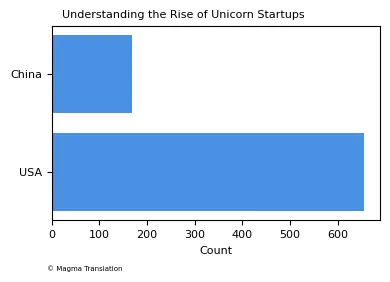
The Economic Impact of Unicorn Startups
Unicorns and Job Creation
Unicorn startups have a significant impact on job creation, with many companies employing thousands. For instance, ByteDance employs approximately 150,000 people, while SHEIN has over 100,000 employees. In total, unicorns have created millions of jobs globally, contributing to economic growth. In 2023, the number of unicorns in India reached 118, showcasing the startup ecosystem's expansion. Moreover, the average unicorn is valued at $1 billion, indicating their substantial economic footprint.
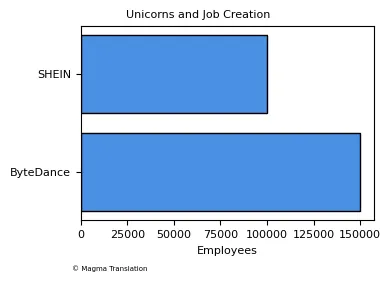
The Role of Venture Capital in Unicorn Growth
Venture capital plays a crucial role in the growth of unicorn startups. In 2021, venture capital funding reached $129 billion in the U.S. alone. This influx of capital has allowed startups to scale rapidly, with 308 companies joining the unicorn list that year. Notably, AI startups have attracted significant investment, with 36% of new unicorns in 2024 being AI-focused. The average funding round for unicorns has increased, reflecting the growing interest from investors.
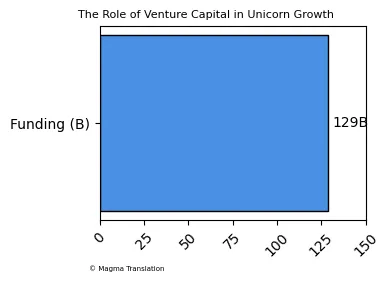
Geographical Distribution of Unicorns
The geographical distribution of unicorns highlights the concentration of startups in specific regions. As of 2024, the U.S. leads with 656 unicorns, while China has 168. India ranks third with 118 unicorns. The San Francisco Bay Area remains a key hub, hosting over 190 unicorns. This concentration of startups in specific regions fosters innovation and collaboration, driving further growth.
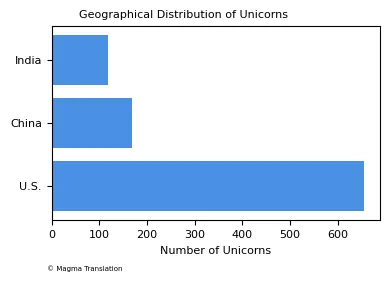
Challenges Faced by Unicorn Startups
Despite their success, unicorn startups face numerous challenges. A significant 95% reduction in proceeds from companies going public was observed between February 2022 and the end of 2023. Additionally, only 7% of unicorns have gone public or been acquired for over $1 billion. This indicates a challenging environment for startups to maintain their valuations and achieve sustainable growth.
The Future of Unicorn Startups
The future of unicorn startups looks promising, with projections indicating that the number of unicorns will continue to rise. By 2030, India aims to reach 250 unicorns. Furthermore, the global unicorn count is expected to exceed 1,200 in the coming years. The increasing focus on technology and innovation will likely drive the emergence of new unicorns across various sectors.
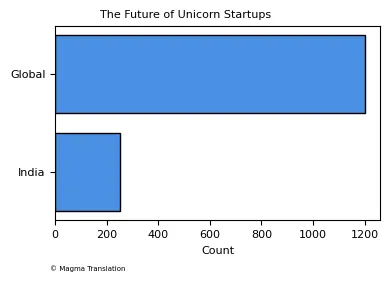
Unicorns in the Tech Sector
The technology sector is a dominant force among unicorn startups. As of 2024, software and IT firms make up nearly 48% of the total unicorns. Notable tech unicorns include ByteDance, valued at US$220 billion, and SpaceX, valued at US$180 billion. The tech sector's growth is fueled by advancements in AI, cloud computing, and other emerging technologies.
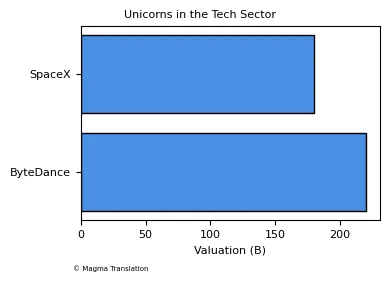
Investment Trends in Unicorn Startups
Investment trends in unicorn startups reveal a shift towards sectors like AI and fintech. In 2024, 36 of the 72 new unicorns were AI startups, indicating a growing interest in this area. Additionally, the fintech sector has seen significant growth, with unicorns like MoneyView valued at 1.2 billion dollars. This trend highlights the increasing importance of technology in financial services.
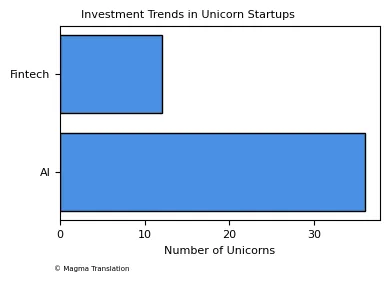
Unicorn Startups and Market Valuation
The market valuation of unicorn startups has reached unprecedented levels. As of 2024, the total valuation of unicorns is estimated to exceed $4 trillion. This valuation reflects the immense potential of these companies to disrupt traditional industries. Notably, unicorns like Stripe and OpenAI have achieved valuations of US$152 billion and US$100 billion, respectively.
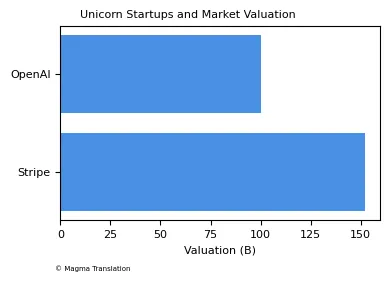
Unicorns and Their Contribution to Innovation
Unicorn startups are at the forefront of innovation, driving advancements across various sectors. The rise of AI has led to the emergence of numerous unicorns, with 95% of founders believing that generative AI is a gamechanger for their industries. This innovation is not only transforming businesses but also enhancing customer experiences. Companies like Ather Energy and Rapido are examples of startups leveraging technology to create impactful solutions.
The Social Impact of Unicorn Startups
Unicorns and Community Development
Unicorn startups are increasingly focusing on community development and social impact. Many of these companies are investing in local initiatives and supporting social causes. For instance, SHEIN has been involved in various community outreach programs, contributing to local economies. Additionally, unicorns like Zepto are creating jobs and enhancing local infrastructure. In 2023, unicorns contributed to over 100,000 jobs globally, showcasing their role in economic development. Furthermore, many unicorns are adopting sustainable practices, aligning their business models with environmental goals.
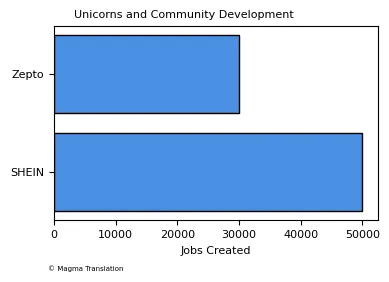
The Influence of Unicorns on Market Trends
Unicorn startups significantly influence market trends and consumer behavior. As of 2024, the rise of AI and fintech unicorns has reshaped industries, with 36% of new unicorns being AI-focused. This shift is driving innovation and competition across sectors. For example, Climate Tech unicorns are gaining traction, with a growing number of startups addressing environmental challenges. The impact of these trends is evident in consumer preferences, as more individuals seek tech-driven solutions for everyday problems.
Unicorns and Global Economic Growth
Unicorn startups play a vital role in global economic growth. As of 2024, the total valuation of unicorns is estimated to exceed $4 trillion. This immense value contributes to the overall economy, with unicorns driving innovation and creating jobs. In 2023, unicorns raised over $129 billion in funding, reflecting investor confidence in their potential. Moreover, unicorns are increasingly expanding into international markets, further enhancing their economic impact and fostering global trade.
The Evolution of Unicorn Startups
Historical Growth of Unicorns
The concept of unicorn startups has evolved significantly since its inception. In 2013, there were only 39 unicorns, but by 2021, this number had skyrocketed to 943. The rapid growth reflects the increasing interest in startups and innovation. As of 2024, the number of unicorns is projected to exceed 1,200, indicating a robust startup ecosystem.
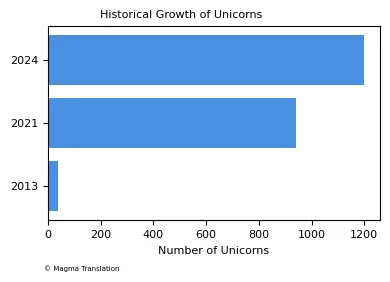
Unicorns in Emerging Markets
Emerging markets are witnessing a surge in unicorn startups. Countries like India have seen their unicorn count rise to 118 as of 2024. This growth is fueled by increased investment and a burgeoning tech ecosystem. In Africa, there are currently seven unicorns, predominantly in fintech and digital sectors, showcasing the continent's potential.
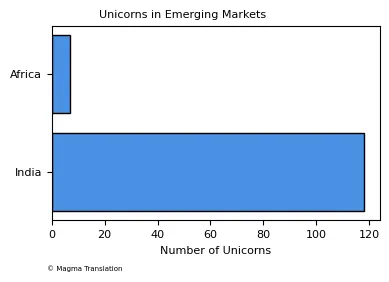
Unicorns and Technological Innovation
Unicorn startups are at the forefront of technological innovation. As of 2024, AI startups represent 44% of new unicorns, highlighting the sector's rapid growth. Companies like OpenAI and Stripe are leading the charge, driving advancements in machine learning and payment solutions.
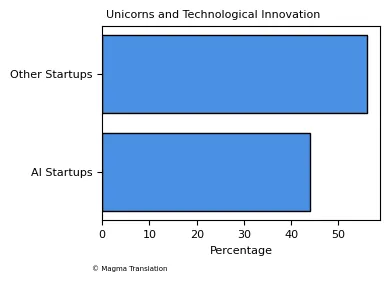
Investment Patterns in Unicorn Startups
Investment patterns in unicorn startups reveal a shift towards technology-driven sectors. In 2023, unicorns raised over $129 billion in funding, with a significant portion directed towards AI and fintech. The average funding round for unicorns has increased, reflecting investor confidence in their growth potential.
Unicorns and Market Disruption
Unicorn startups are known for disrupting traditional markets. Companies like Airbnb and Uber have transformed the hospitality and transportation industries, respectively. As of 2024, the total valuation of unicorns is estimated to exceed $4 trillion, showcasing their significant impact on the global economy.
Challenges Faced by Unicorn Startups
Despite their success, unicorn startups face numerous challenges. A significant 95% reduction in proceeds from companies going public was observed between February 2022 and the end of 2023. Additionally, only 7% of unicorns have gone public or been acquired for over $1 billion, indicating a challenging environment for maintaining valuations.
Unicorns and Consumer Behavior
Unicorn startups significantly influence consumer behavior and preferences. The rise of tech-driven solutions has led to a shift in how consumers interact with products and services. For instance, Climate Tech unicorns are gaining traction, with consumers increasingly seeking sustainable options. This trend is reshaping market dynamics and driving innovation.
Future Projections for Unicorn Startups
The future of unicorn startups looks promising, with projections indicating continued growth. By 2030, India aims to reach 250 unicorns. The increasing focus on technology and innovation will likely drive the emergence of new unicorns across various sectors, further enhancing their economic impact.
Unicorns and Global Collaboration
Unicorn startups are increasingly engaging in global collaboration to drive innovation. Many companies are forming partnerships to leverage resources and expertise. For example, 93% of NFX founders are using AI tools to enhance productivity. This collaborative approach is fostering a culture of innovation and accelerating growth across industries.
The Economic Impact of Unicorn Startups
Unicorns and Job Creation
Unicorn startups have a significant impact on job creation, with many companies employing thousands. For instance, ByteDance employs approximately 150,000 people, while SHEIN has over 100,000 employees. In total, unicorns have created millions of jobs globally, contributing to economic growth. In 2023, the number of unicorns in India reached 118, showcasing the startup ecosystem's expansion. Moreover, the average unicorn is valued at $1 billion, indicating their substantial economic footprint.
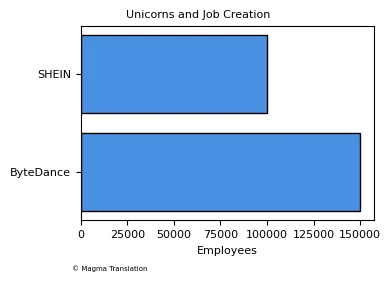
The Role of Venture Capital in Unicorn Growth
Venture capital plays a crucial role in the growth of unicorn startups. In 2021, venture capital funding reached $129 billion in the U.S. alone. This influx of capital has allowed startups to scale rapidly, with 308 companies joining the unicorn list that year. Notably, AI startups have attracted significant investment, with 36% of new unicorns in 2024 being AI-focused. The average funding round for unicorns has increased, reflecting the growing interest from investors.
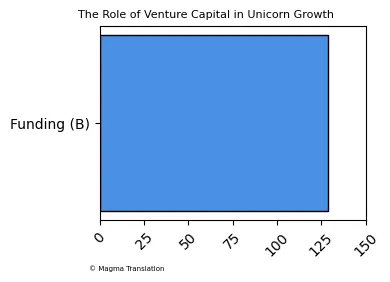
Geographical Distribution of Unicorns
The geographical distribution of unicorns highlights the concentration of startups in specific regions. As of 2024, the U.S. leads with 656 unicorns, while China has 168. India ranks third with 118 unicorns. The San Francisco Bay Area remains a key hub, hosting over 190 unicorns. This concentration of startups in specific regions fosters innovation and collaboration, driving further growth.
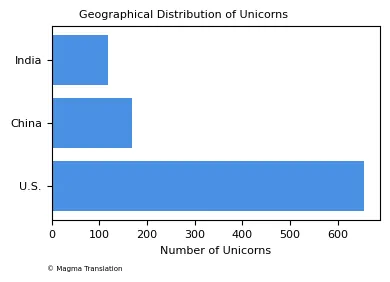
Challenges Faced by Unicorn Startups
Despite their success, unicorn startups face numerous challenges. A significant 95% reduction in proceeds from companies going public was observed between February 2022 and the end of 2023. Additionally, only 7% of unicorns have gone public or been acquired for over $1 billion. This indicates a challenging environment for startups to maintain their valuations and achieve sustainable growth.
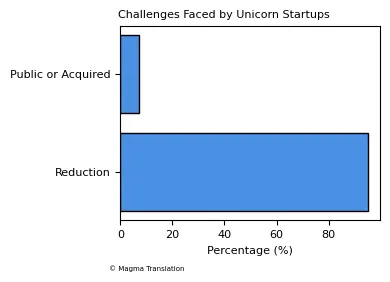
The Future of Unicorn Startups
The future of unicorn startups looks promising, with projections indicating that the number of unicorns will continue to rise. By 2030, India aims to reach 250 unicorns. Furthermore, the global unicorn count is expected to exceed 1,200 in the coming years. The increasing focus on technology and innovation will likely drive the emergence of new unicorns across various sectors.
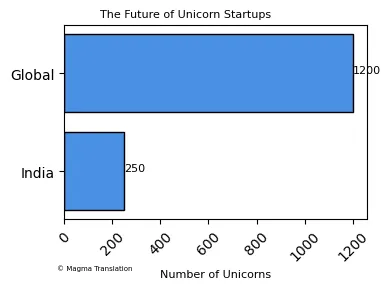
Unicorns in the Tech Sector
The technology sector is a dominant force among unicorn startups. As of 2024, software and IT firms make up nearly 48% of the total unicorns. Notable tech unicorns include ByteDance, valued at US$220 billion, and SpaceX, valued at US$180 billion. The tech sector's growth is fueled by advancements in AI, cloud computing, and other emerging technologies.
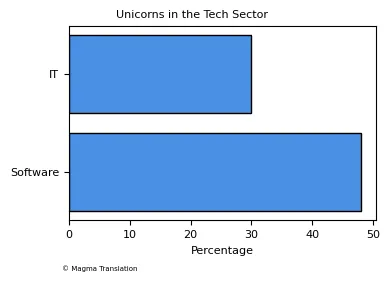
Investment Trends in Unicorn Startups
Investment trends in unicorn startups reveal a shift towards sectors like AI and fintech. In 2024, 36 of the 72 new unicorns were AI startups, indicating a growing interest in this area. Additionally, the fintech sector has seen significant growth, with unicorns like MoneyView valued at 1.2 billion dollars. This trend highlights the increasing importance of technology in financial services.
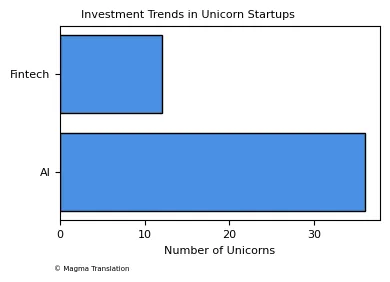
Unicorns and Their Contribution to Innovation
Unicorn startups are at the forefront of innovation, driving advancements across various sectors. The rise of AI has led to the emergence of numerous unicorns, with 95% of founders believing that generative AI is a gamechanger for their industries. This innovation is not only transforming businesses but also enhancing customer experiences. Companies like Ather Energy and Rapido are examples of startups leveraging technology to create impactful solutions.
Unicorns and Market Valuation Trends
The market valuation of unicorn startups has reached unprecedented levels. As of 2024, the total valuation of unicorns is estimated to exceed $4 trillion. This valuation reflects the immense potential of these companies to disrupt traditional industries. Notably, unicorns like Stripe and OpenAI have achieved valuations of US$152 billion and US$100 billion, respectively.
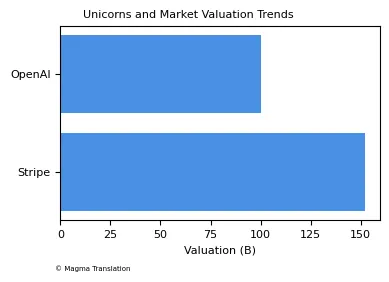
Conclusion
Unicorn startups have become a significant force in the global economy, driving innovation, job creation, and market trends. Their impact is felt across various sectors, and as they continue to grow, they will play an essential role in shaping the future of business.
